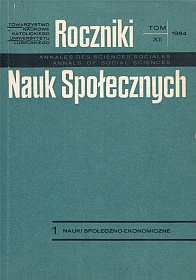Unification of Personal Models in Polish Society after the 2nd World War
Abstract
The personal model is a complex of mutually compact life goals, action and behavioural motivations and individualistic features. It is closely connected with values accepted in a given group and with the accepted ideology, its vision of interhuman relations and social structures which the group wishes to realize among its members and in society. Such a personal model is called the propagated personal model. Apart from that one can differentiate between the realized or materialized personal models. This is also a mental construction formed on the basis of the values most appreciated in the group, life goals, most common motivations, behaviour and individualistic features. The realized personal model is thus the most common type of man in a given social group. However, there is always some kind of difference between the two models and the smaller it is the better position is occupied by the propagated model.
Personal pattern must be differentiated from the personal model. The former are concrete people who have realized the propagated personal model best and their lives are set to others as examples. The hero is a special type of a personal pattern. He is someone who realized the values and goals defined by the propagated personal model with unequalled passion and devotion.
Every group witch has its own personal model also has its heroes — authentic or created by literature, film or theatre. The heroes arouse admiration and fascination with their extraordinary behaviour, bring the values and features of the propagated personal model closer to people and at the same time bind and encourage others to realize this model.
With the imposition of socialist system in Poland after the 2nd world war the Polish Workers’ Party, and later the Polish United Workers’ Party, began popularizing the socialistic man personal model. The Party hoped that the socialistic man model would eventually supercede the personal models functioning so far and consolidate the new socialist sociopolitical system in Poland. Until this day, however, the unification of personal models has not taken place. This can be accounted for by the following facts:
1) The strongly strange character of the socialistic personal model in relation to the already functioning models. This strangeness consisted primarily in the complete separation from the transcendent world and giving total priority to the society-state over the person-individual while the existing models in Poland were largely based on religious ideology and gave priority to the individual over the state thus assigning ancillary or serving functions to the state.
2) The socialistic model of man is closely connected with politics and economy, and these often undergo changes, which, in turn, cause shifts in the stressed elements of the personal model. This fact does not allow the complete socialistic model of man to consolidate either in the mind of those who popularize it orthose who remain under its influence. This pertains also to models of behaviour based on this model.
3) The socialistic personal model projected to function in large social groups while man lives in microstructure and in small groups he lives his life. Among young people, who show a tendency to create small social groups, the socialistic model of man is not attractive. This model neglects the whole sphere of inner personal life.
4) The number of people who accept and realize the socialistic personal model is still to small too be followed by young people.
5) It has an insufficient number of heroes, with gaps in their life histories. In most cases the are heroes struggling for the socialist system but one can hardly find such heroes who lived in their system and worked to improve the living conditions in Poland.
6) The young generation of Poles is unwilling to define its attitude to the ready-made personal models and protects itself against forceful imposition of this model. Young people wish to create models themselves basing on different models they can find in their environment, literature and film.
7) In Poland there are numerous small groups possessing their own personal models and effectively protecting their memebers against impositions of other models.
Copyright (c) 1984 Roczniki Nauk Społecznych

This work is licensed under a Creative Commons Attribution-NonCommercial-NoDerivatives 4.0 International License.


